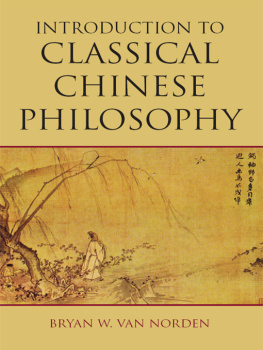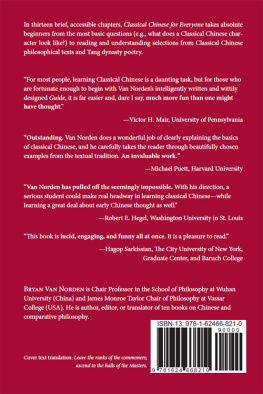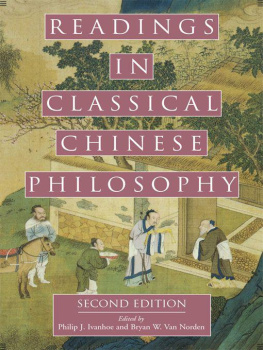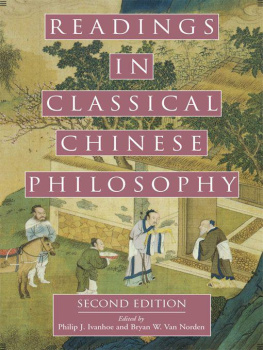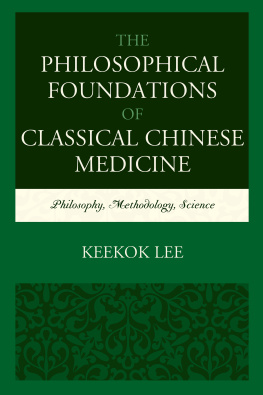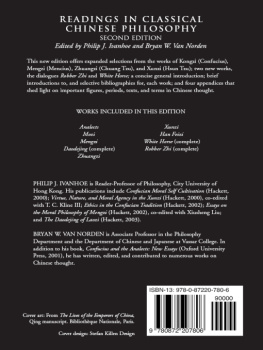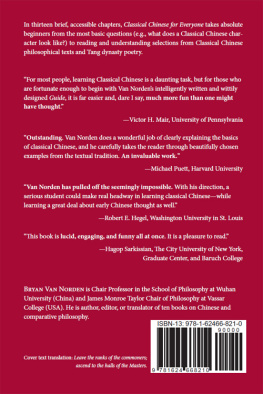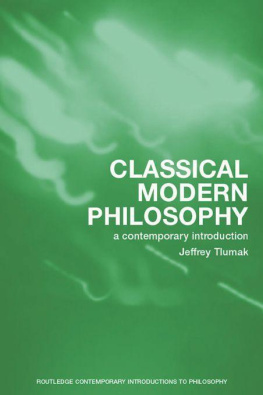Van Norden - Introduction to classical Chinese philosophy
Here you can read online Van Norden - Introduction to classical Chinese philosophy full text of the book (entire story) in english for free. Download pdf and epub, get meaning, cover and reviews about this ebook. year: 2011, publisher: Hackett Publishing Company, Inc, genre: Religion. Description of the work, (preface) as well as reviews are available. Best literature library LitArk.com created for fans of good reading and offers a wide selection of genres:
Romance novel
Science fiction
Adventure
Detective
Science
History
Home and family
Prose
Art
Politics
Computer
Non-fiction
Religion
Business
Children
Humor
Choose a favorite category and find really read worthwhile books. Enjoy immersion in the world of imagination, feel the emotions of the characters or learn something new for yourself, make an fascinating discovery.
- Book:Introduction to classical Chinese philosophy
- Author:
- Publisher:Hackett Publishing Company, Inc
- Genre:
- Year:2011
- Rating:3 / 5
- Favourites:Add to favourites
- Your mark:
- 60
- 1
- 2
- 3
- 4
- 5
Introduction to classical Chinese philosophy: summary, description and annotation
We offer to read an annotation, description, summary or preface (depends on what the author of the book "Introduction to classical Chinese philosophy" wrote himself). If you haven't found the necessary information about the book — write in the comments, we will try to find it.
Van Norden: author's other books
Who wrote Introduction to classical Chinese philosophy? Find out the surname, the name of the author of the book and a list of all author's works by series.
Introduction to classical Chinese philosophy — read online for free the complete book (whole text) full work
Below is the text of the book, divided by pages. System saving the place of the last page read, allows you to conveniently read the book "Introduction to classical Chinese philosophy" online for free, without having to search again every time where you left off. Put a bookmark, and you can go to the page where you finished reading at any time.
Font size:
Interval:
Bookmark:


HERMENEUTICS, OR
HOW TO READ A TEXT
Heres what is necessary: one blow with a club, one scar; one slap on the face, a handful of blood. Your reading of what other people write should be like this. Dont be lax!
Zhu Xi
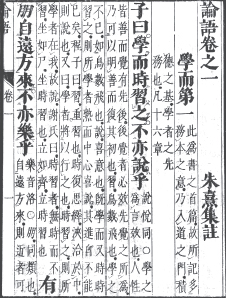
This image shows the text of the Analects of Kongzi (in large, boldface characters) with the orthodox commentary of Zhu Xi (written in double columns beneath each section of the original classic). Textual commentaries like that of Zhu Xi are needed because of the hermeneutic circle between the reader and the text.
Hermeneutics is the theory of how to understand texts. Hermeneutics is necessary and important because the relationship between readers and texts depends on complex cultural factors. For example, prior to the invention of printing with movable type (which came about in China in the eleventh-century CE, and then in fifteenth-century Europe), written works had to be copied by hand. This was extremely labor intensive, so books were rare and expensive. However, with the invention of the printing press, books could be mass-produced, so they were cheaper and more readily available. This changed many things in society, including how we read. Prior to mass-production, people read intensively: they read a few books that really mattered to them and they read those books slowly, carefully, and repeatedly. Nowadays, we are expected to read more extensively, but as a result we read once, or perhaps just skim, a lot of different books. In many ways, this is a good thing. The profusion of books led to increased knowledge and literacy. And, frankly, most books are worth only one reading, at most. As Renaissance philosopher Francis Bacon put it:
Some books are to be tasted, others to be swallowed, and some few to be chewed and digested; that is, some books are to be read only in parts; others to be read, but not curiously; and some few to be read wholly, and with diligence and attention.
There is a downside to extensive reading: we can become so used to skimming books casually that we forget to slow down when we need to. The thinkers we are examining in this book are among the greatest philosophers of world history. The depth of what they have to say can only be appreciated if we read them carefully and repeatedly. So the first lesson that hermeneutics can teach us is that we should read and reread classic texts wholly, and with diligence and attention.
There are two broad hermeneutic approaches: a hermeneutic of suspicion and a hermeneutic of faith. The distinction is easiest to grasp with an example. Sir Arthur Conan Doyle was a medical doctor and author of one of the greatest literary paradigms of rationality, Sherlock Holmes. However, he was also an enthusiastic advocate of Spiritualism. How should we interpret Doyles claim that one can communicate with the dead through Spiritualist practices such as Ouija boards, sances, and mediums?
Doyle became friends with the famed American escape artist and magician Harry Houdini. Houdini examined the evidence that Doyle presented to justify his belief in spiritualism. Mediums had reported to Doyle many facts about his deceased relatives. In addition, objects had levitated during sances Doyle had attended. Doyle argued that these things would be impossible without the assistance of spirits. Houdini replied that people claiming to communicate with the dead might use a stage magicians technique called cold reading that appears to report new information, when it is actually just the medium eliciting information from the audience. Similarly, the movement of objects during sances (during which participants are asked to sit very still, in darkness) is easily explained by wires or the assistance of the mediums accomplices. Doyle was never convinced by Houdinis explanations and died a committed Spiritualist.
Although he disagreed with Doyle, Houdini was using a hermeneutic of faith in interpreting what Doyle claimed. In a hermeneutic of faith (also called a hermeneutic of restoration), one examines the rational justification for someones claims. What evidence does someone give for the claims? Why might we think that the claims are plausible? What are the arguments given in favor of the claims? In general, a hermeneutic of faith asks, Why might we think that what someone is claiming is true? As the case of Doyle and Houdini illustrates, using a hermeneutic of faith does not require that we agree with the person or text we are interpretingits not a hermeneutic of blind faith. However, a hermeneutic of faith takes a text seriously as a candidate for truth.
There is more to the story of Doyles Spiritualism. Doyle had fallen into a severe depression after his own son, his brother, his two brothers-in-law, and two of his nephews were killed during World War I. His interest in Spiritualism grew after the war. His belief that sances offer evidence of an afterlife and allow the living to communicate with the dead helped bring him out of his depression. Consequently, it seems likely that Doyle believed in Spiritualism so firmly (even in the face of strong evidence against it) because it offered him psychological comfort over the death of his family members.
The explanation I have just given for Doyles belief employs a hermeneutic of suspicion. When using a hermeneutic of suspicion, one looks for explanations for why someone makes certain claims that sever the connection between those claims and truth. Among the most famous practitioners of hermeneutics of suspicion are Karl Marx, Friedrich Nietzsche, Sigmund Freud, and Michel Foucault. Marx claimed that (for example) philosophers argue in favor of the existence of a right to private property not because it is true that there is such a right or because there is good evidence in favor of it but because the belief in such a right serves the economic interests of the capitalist class. Nietzsche and Foucault both attempt to explain individual actions, theories, and social institutions in terms of expressions of human power. So philosophers like Plato claim to be engaged in a disinterested search for objective truth, but (Nietzsche suggests) they actually use philosophical argument as a tool to control and silence others. Words are the weapons that philosophers use instead of fists. If you think of how arguments are often used in courtrooms or political debates today, youll understand Nietzsches point. In general, to use a hermeneutic of suspicion, ask how making a claim and convincing someone of it serves someones ulterior interests (such as for wealth, power, or just psychological comfort).
A hermeneutic of faith considers whether a text might be true or rationally justified, while a hermeneutic of suspicion examines the hidden motivations for composing a text that are not connected to its being true or justified. Most people have a preference for one hermeneutic style over the other. When the president gives a speech in favor of a new law or policy, what do you focus on? Are you primarily interested in whether his proposals are justified? Do you examine whether there is evidence to back up what he is saying? Are you concerned with the ethical values that he is promoting and whether you share them? If so, you probably prefer a hermeneutic of faith. Or do you focus on the likely political motives of the presidents speech? Is he giving this speech in order to firm up support among the voters and politicians of his own party, because hell need it to get his legislation passed? Or is the president reaching out to swing voters, because he is coming up for reelection himself or wants to help his partys Congressional candidates in the upcoming midterm election? These are the questions that a hermeneutic of suspicion asks.
Next pageFont size:
Interval:
Bookmark:
Similar books «Introduction to classical Chinese philosophy»
Look at similar books to Introduction to classical Chinese philosophy. We have selected literature similar in name and meaning in the hope of providing readers with more options to find new, interesting, not yet read works.
Discussion, reviews of the book Introduction to classical Chinese philosophy and just readers' own opinions. Leave your comments, write what you think about the work, its meaning or the main characters. Specify what exactly you liked and what you didn't like, and why you think so.

